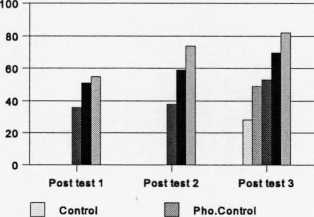paired samples) revealed that the differences were significant for each group (see Table 7.5).
On the other hand, there were no significant differences between the groups in each test.
7.4.2 The post test measures
7.4.2.1 The Production measures
7.4.2.1.1 Naming Task
Scoring criteria for the naming task
Each child had to answer four questions. Each response was scored 1 for correct and 0 for
incorrect. To be scored correct, the response had to be the accurate production of the target
word. Any other response was scored as incorrect. Each child could get a score from 1- 4. An
error analysis was also carried out (see in later section).
Analysis
Figure 7.1 below shows the number of correct responses of the different groups across
testing. There was a maximum group score of 104.The Control, Phonological control and
Ostensive definition group performed at a very low level, while the Lexical contrast and
Definition group performed better than the others.
Figure 7.1 Total number of correct responses on the naming task by group across

ІЛ Lex. Contrast
B Oste. Definition
□ Definition
testing
Is there a differential impact of the type of exposure to new lexical items that the children
receive in their performance on the naming task?
Three One Way Analyses of Variance (for the three post tests) were carried out to test group
differences. Each time, group was the independent variable and score on the naming task was
197
More intriguing information
1. L'organisation en réseau comme forme « indéterminée »2. Quality practices, priorities and performance: an international study
3. The Impact of Cognitive versus Affective Aspects on Consumer Usage of Financial Service Delivery Channels
4. Ein pragmatisierter Kalkul des naturlichen Schlieβens nebst Metatheorie
5. The InnoRegio-program: a new way to promote regional innovation networks - empirical results of the complementary research -
6. The urban sprawl dynamics: does a neural network understand the spatial logic better than a cellular automata?
7. Locke's theory of perception
8. The name is absent
9. Why Managers Hold Shares of Their Firms: An Empirical Analysis
10. PRIORITIES IN THE CHANGING WORLD OF AGRICULTURE